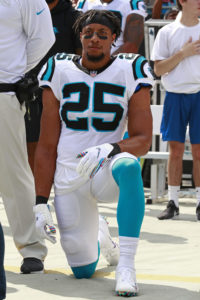In 2018, Earl Thomas got into a nasty dispute with Seahawks management over a new contract. Seattle would not relent, and Thomas eventually returned and played a final year with $8.5 million remaining on his contract. Thomas played just four games in 2018 due to a broken leg, but that didn’t prevent the Ravens from giving him a new 4-year contract worth $55M, with $32M guaranteed.
In 2018, Eric Reid’s shadow loomed over the safety market: he went unsigned all summer, presumed at least in part due to the controversy surrounding his kneeling during the national anthem and the related grievance against the league that the NFLPA filed on his behalf. He eventually signed a 1-year deal worth less than $2M with the Panthers, but this week, he re-signed with Carolina on a 3-year, $22M deal (that, at a minimum, will be a 1-year, $9M deal).
Tyrann Mathieu was frustrated last summer, too, in the midst of a brutal market for safeties. He wound up signing a 1-year deal with Houston for $7M. This offseason? Mathieu just inked a 3 year, $42,000,000 deal with Kansas City.
In 2018, Kurt Coleman signed with the Saints after being released by Carolina. He signed a 3-year, $16.35M deal, but has already been released; that contract ended up being a 1-year, $6.3M deal. The other most “notable” signing was Morgan Burnett with the Steelers, to a three year, $14.35 million contract. Otherwise, safeties didn’t sign any notable contracts a year ago, in stark contrast to 2019.
Kenny Vaccaro was a high profile free agent last year, but he was limited to a 1-year, $1.1M deal with the Titans in 2018. Tennessee just resigned him, though, now to a 4-year, $26M deal with $12M guaranteed. That’s a pretty nice upgrade.
Even 34-year-old Eric Weddle just signed a 2-year, $11.5M contract with the Los Angeles Rams, with a worst-case scenario being that contract turns into a 1-year, $6.25M deal. Adrian Amos signed a 4 year, $36M contract with the Packers, with $12M guaranteed, while LaMarcus Joyner (who played 2018 on the franchise tag) signed with the Raiders for 4 years and $42M, with half of that number guaranteed. Tashaun Gipson was signed by Houston to a 3-year, $22.5 million contract, with half guaranteed. Ha Ha Clinton-Dix signed a 1-year deal for $3.5M in Chicago, and apparently left more on the table.
These signings represent a 180 from last off-season, and that’s with Eric Berry and Tre Boston (who, as the safety market never materialized, signed a 1-year, $1.5M deal with Arizona in 2018), and others still to come. And with the 2019 safety market blooming, it makes it harder to explain away the poor 2018 safety market as a nebulous confluence of events (with one potential explanation — that safeties were being devalued in the modern game — holding less water now).
Mike Mitchell, who signed a 1-year deal with the Colts in October of 2018 for less than $1M, is also still unsigned, but will likely make more money in 2019, too. Mitchell had an explanation for what happened last off-season, which he told The Athletic:
“You know what happened,” Mitchell said. “I don’t need to say it. I know what you know.”
That was Mitchell’s way of acknowledging what multiple sources said throughout the offseason: That NFL teams took an intentionally cool approach toward free-agent safeties in 2018 to avoid the appearance of collusion against Eric Reid, the former 49ers standout who last week signed with the Panthers after his own protracted stay on the free-agent market.
Mitchell was not alone. Boston, more explicitly, told TheRinger.com the same story in August:
Onlookers have linked Reid’s continued unemployment to his connection to Kaepernick, and Boston suggests the effect of Reid’s apparent blackballing is more wide-ranging than it may appear. “People have to think beyond just one person,” Boston says. “How are you going to look at a whole market if you sign everybody and one person is left? You don’t put yourself in that predicament. You devalue the whole market.”
In Boston’s eyes, NFL teams are trying to cover themselves for not going after Reid. “Last year, [there were] three highly paid safeties,” Boston says, alluding to Berry, Chancellor, and Reshad Jones. “It was the highest our market has ever been. And then it just flops this year. It’s the first year any top-five group of free agents has waited into training camp. And a week into camp two of the top five sign. It’s just obvious [what the reasoning is]. I don’t understand why the questions are even there.”
The real world rarely offers clear explanations of events, but I suspect NFL owners are happy that Reid’s grievance has been settled.

